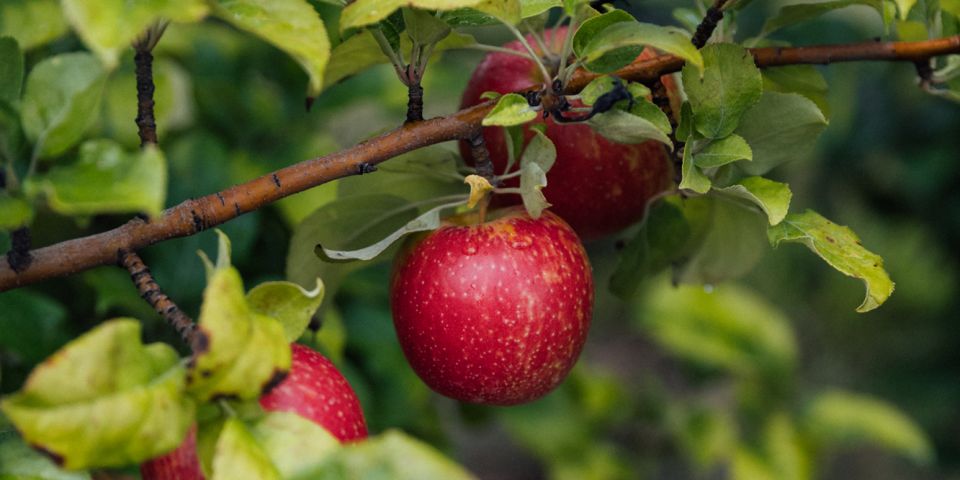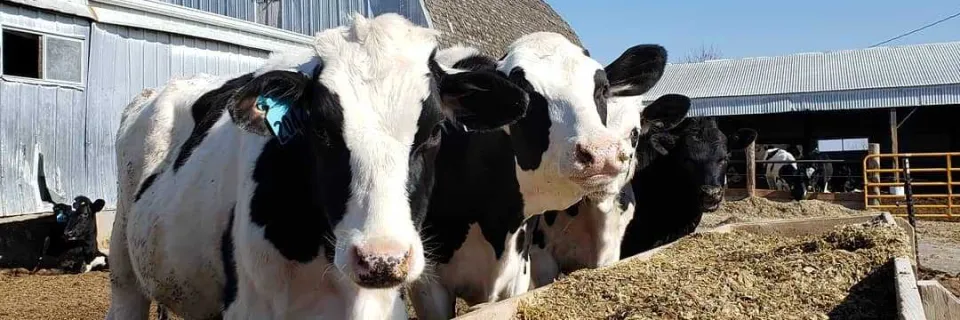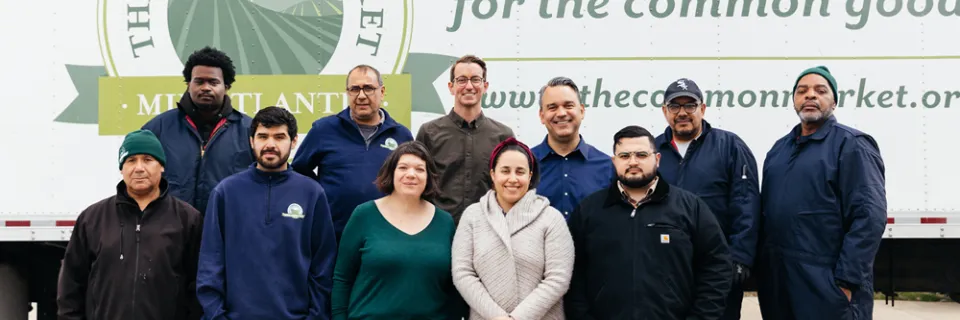Let's Connect
Our friendly and educated team is here to partner with you every step of the way. Connect today to learn of all the ways to partner with The Common Market.
The Common Market Great Lakes has partnerships with 50+ regional farmers and producers.
Delivering local food for the common good.

by D Laninga
The Midwest is a land of plenty with a strong agricultural tradition. Yet despite being surrounded by rich farmland, too many who live here cannot access fresh local food due to the erosion of pathways that connect farmers with their neighbors and communities. This breakdown of regional supply chains has also prevented many small and independent farmers from selling their products at a scale that keeps their businesses viable.
The Common Market has a vision to rebuild these supply chains, and a strategy to achieve that vision that’s been proven in the Mid-Atlantic and southern regions of the United States. Our latest hub, The Common Market Great Lakes, has already made strides to improve local supply chains in the greater Chicago area — and our current momentum will swiftly carry us to more milestones.
Read on to learn how The Common Market Great Lakes is blazing new pathways to direct the Midwest’s existing abundance onto the plates of its people.
The Common Market Great Lakes officially launched in 2023, but we have been actively building community there for many years, taking a slow, intentional approach to establishing a Midwestern hub.
In 2017, The Common Market connected with food system leaders already working on transforming the regional food system, including those at the Illinois Stewardship Alliance and Chicago Food Policy Action Council. Next, we brought Eliana Pinilla aboard, now serving as one of two partnership directors for the region.
Pinilla mapped out the region’s food system, identified gaps, and discovered places The Common Market could be additive — not just in rebuilding supply chains, but also in improving food justice in the area.
“There were already heavy hitters in the space, people who have committed their lifetime to improving the conditions in which we access food,” says Pinilla, describing the leadership already in place in Chicago and the surrounding region. The first couple of years, Pinilla met with people, listened to them, and asked questions: “Whatever place I was in, I got to meet people playing different roles in the system: institutions, growers, eaters.”
Having become part of the community, we found ourselves occupying a new and unique position in the region: a bridging force, forging synergies and relationships among the Midwest’s many food system leaders and organizations. “We connect the dots,” says Pinilla simply. “The things have been here all along, but I think by being new [and] … neutrally listening to all parties involved, we’ve been able to create connection points and act.”
Chicago Local Foods was a natural partner for The Common Market. With a decade of experience supporting local agriculture in the greater Chicago area, Local Foods was already aligned with our mission to make fresh, healthy, locally sourced food accessible. With the acquisition of Local Foods complete in 2023, our respective teams seamlessly joined forces — creating The Common Market Great Lakes, a powerful new force in the cause to empower local farmers and strengthen communities.
To strengthen Chicago's local food ecosystem, The Common Market Great Lakes is on a mission to help anchor institutions like schools and hospitals purchase more fresh, local food. The amount of local, sustainably sourced food a school or hospital serves can drastically reduce the institution’s ecological footprint, integrate it more deeply into the community, and make a big difference to the health and nourishment of community members.
Since our launch, The Common Market Great Lakes has made it easier for these institutions to bring fresh local food to the communities they serve. We stand ready to partner with institutions throughout Chicagoland. While every food service director can tell you that shifting an institution’s procurement practices is a challenging process, read on to learn how we make working with our farmers, ranchers, and producers as smooth as possible.
One challenge institutions face in buying more local and sustainable food is the requirement to buy only from vendors with third-party food safety certifications. This is often the first thing a potential partner will ask for, says Tatiana Garcia Granados, The Common Market’s co-founder and resident food safety expert.
Long ago, Garcia Granados recognized that food safety concerns posed a major barrier to markets for independent farmers. Part of it is a shared cultural mentality: “There is a perception that smaller operations are more dangerous,” Garcia Granados says. Beyond that, most food in this country moves through wholesale markets in which buyers require food safety certifications. This unfortunately benefits the biggest companies selling the most processed food to the exclusion of almost everyone else: The certifications themselves are costly, and they also pose an administrative burden that smaller-scale producers just can’t shoulder.
“We wanted local food to be on an even footing,” said Garcia Granados. Motivated by a desire to give farmers a fighting chance in these markets, she led the charge to earn this certification for The Common Market. “We set our standards high,” she says of the industry-standard certification, called SQF (Safe Quality Food), that she eventually pursued and obtained for The Common Market.
Our team proudly earns “Excellent” scores in each annual audit, consistently out-scoring bigger, well-resourced companies. “We’re deliberate, and staff is focused on success,” explains Garcia Granados. Learning of the SQF certification and “Excellent” rating eases the minds of food service directors: From the institution’s perspective, it signals that fresh, local, sustainably produced food can reach the pinnacle of safety and quality, and has opened doors for more institutional partnerships.
For large, complex organizations like schools and hospitals, shifting procurement to more local and sustainable products also poses logistical difficulties, as it involves coordinating with multiple vendors while ensuring consistent supply. The Common Market Great Lakes offers a solution.
Partnership Director Eliana Pinilla notes that a very common — and very human — “all or nothing” mindset often gets in the way of progress. “People think they need to be all local, that it’s not good enough unless they have X percent of their spend in local regional procurement.” But she says there is a lot of power in starting progressively, and that The Common Market Great Lakes team is intentional about meeting people where they are and understanding each institution's capacity.
She says some of the most successful relationships with institutional partners begin by identifying just one product they can consistently commit to. There are many ways to start small with local products that won’t interfere with other commitments, with apples and lettuce being two common low-threshold products. Pinilla says that the first product Common Market Great Lakes ever moved was an order of apples for the Cook County Sheriff's Office. “The woman I talked to said, ‘You have a more competitive price than apples from Washington, and they’re fresher, too.’”
For The Common Market Great Lakes, the goal is to support our institutional partners on a journey, not push them to make bold but unsustainable changes. And while taking a chance on a small order of a local product won’t impact an institutional partner, it produces a ripple effect that makes huge waves for the farmers we work with.
If SQF certification opens doors to selling more local food to institutional partners, we at The Common Market recognize that we need more local farmers ready to walk through those doors. Working with fruit and vegetable growers with certifications like USDA’s Good Agricultural Practices (“GAP”) and egg farmers with certain state-issued certifications helps The Common Market excel in food safety audits, so a big part of our food safety culture is setting expectations for our producers and approving their operations.
“Most of our growers are already safely operating,” emphasizes Co-Founder Tatiana Garcia Granados, adding that what they most often need help with is the sometimes-burdensome paperwork they need to be certified. The Common Market can help with this too: just as we are committed to our institutional partners’ journeys toward local procurement, so too are we committed to our producers’ success. As we’ve settled into our new Chicago-based hub, we’ve continued to invest in our farmers and ranchers by demystifying food safety protocols and providing technical assistance and cost-sharing where needed. In turn, this investment has yielded an expanding network of local food producers.
Jamie Phelps Proctor was an integral team member in the transition from Chicago Local Foods, and is now a partnership director with The Common Market Great Lakes. He knows the Chicago food ecosystem well. Praising the region’s rich agricultural and food scene, he notes there are robust direct-to-consumer pathways for farmers, like selling at farmers markets where high-end chefs shop. “But that’s limited,” he says, “and will only reach a narrow fraction of the population.”
This is where the mission of first Local Foods, and now The Common Market Great Lakes, comes in. While millions of people in Chicago may never eat at those restaurants, they do attend schools, go to hospitals, and work for colleges and universities. And if those anchor institutions purchase food from local farmers through The Common Market Great Lakes, millions more Chicagoans will have access to that fresh, healthy food.
This plan is already coming to fruition: The Common Market team has worked diligently to help schools and other institutions throughout Chicagoland and beyond become more involved in local procurement, connecting them with farms like Iowa-based family dairy farm, Country View Dairy, for example. Their efforts translated to thousands of kids throughout Chicago’s public school system tasting the dairy’s high-quality (and delicious!) yogurt this past school year, a signal that schools are prioritizing local, nutritiously dense foods.
Food service directors looking for ways to reduce their carbon footprint, offer healthier proteins, and in some instances, save money, now have multiple new options through The Common Market Great Lakes: Ferndale Market is a local sustainable ground turkey supplier whose products are succeeding in schools, and Fischer Farms in Indiana offers beef from regeneratively raised cattle.

Our strength lies in our ability to build networks that reliably connect farmers, ranchers, and producers of food with organizations that serve their communities. Looking to the future, we aim to keep expanding the depth and breadth of our network in the Great Lakes area.
“I'm excited to keep delivering the great products of this region to our neighbors and families, and to reconnect the people of Chicago to the sources of their food,” says Phelps Proctor.
And it is truly exciting to think about what that will mean: more farmers on the land, schools, and hospitals that can reliably purchase fresh and nutritious food, and improved health, wealth, and resilience of the surrounding community.
We hope you can join us on this journey!
“I'm excited to keep delivering the great products of this region to our neighbors and families, and to reconnect the people of Chicago to the sources of their food." — Jamie Phelps Proctor, Partnership Director, The Common Market Great Lakes

Our friendly and educated team is here to partner with you every step of the way. Connect today to learn of all the ways to partner with The Common Market.
"What I most appreciate is the consistency of the produce. I have yet to experience wilted lettuce or incorrect sizing of products and this is something difficult to find with the “big box” companies. I also appreciate Common Market's passion for developing relationships between the farmers and the chefs."
— Mike Bacha, Executive Chef, Emory University Hospital